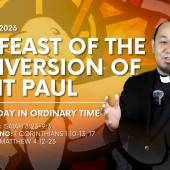Communal confession is as important as individual confession!

October 03, 2025 Friday of the Twenty-sixth Week in Ordinary Time
Daily Readings: Baruch 1:15-22; Luke 10:13-16
The Book of Baruch is a Deutero-canonical book, not accepted as canonical by Protestants. Baruch, the secretary of the Prophet Jeremiah, wrote during the time of the returnees from the Babylonian exile. The tone of today’s passage is apologetic, as Baruch exhorts God’s people to repent. It is a communal confession of the sins of the Jewish community that has returned from exile. Baruch directly blamed the inhabitants of Judah and Jerusalem for their iniquities, especially their disobedience and idolatry-worshipping foreign gods who had nothing to do with Israel. Their refusal to listen to the Lord and their negligence provoked His anger. According to Baruch, all their calamities and curses stemmed from disobedience. The people of Israel had clung to their wicked hearts by serving other gods and doing what is evil.
In today’s Gospel, Jesus draws a distinction between two sets of cities: those in Jewish territory (Chorazin and Bethsaida) and those in Gentile territory (Tyre and Sidon). He condemns the Jewish cities for failing to listen and believe in Him despite witnessing His miraculous deeds. Jesus even declares that Tyre and Sidon would have responded more favorably to His message. Capernaum, at the very center of His Galilean ministry, is also sharply rebuked. In the context of sending out the seventy (or seventy-two) disciples, Jesus warns the people to listen to His envoys. Rejecting them amounts to rejecting Jesus, and rejecting Jesus is the same as rejecting God the Father who sent Him. That, He warns, carries a grave cost.
Call to Action: At the end of the day, what matters most is our ability to listen to and obey God’s Word revealed through His Son, Jesus. Human nature tends to be rebellious. What about me?
Radio Veritas Asia (RVA), a media platform of the Catholic Church, aims to share Christ. RVA started in 1969 as a continental Catholic radio station to serve Asian countries in their respective local language, thus earning the tag “the Voice of Asian Christianity.” Responding to the emerging context, RVA embraced media platforms to connect with the global Asian audience via its 21 language websites and various social media platforms.














